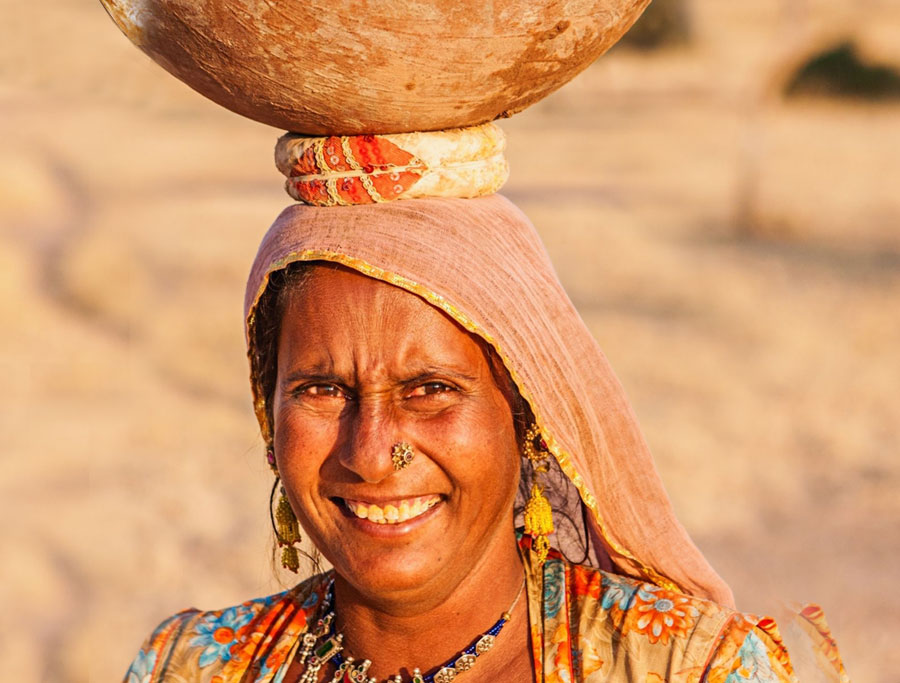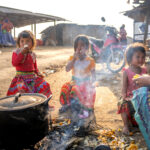The conversation around water conservation has diluted since the Pandemic started spreading across the world at the beginning of last year. Changes in water patterns result in the unavailability of clean drinking water, frequent phenomenal droughts and flash flooding which disproportionately affects the women in every household.The onus of taking care of a family’s needs, securing water, food, fuel for cooking etc. falls primarily on the women. Their dependency on the natural resources is more and over the time women have developed key skills and knowledge related to water harvesting, storage and management.
It is important to note here that women are more vulnerable to the effects of climate change than men due to the biological, socioeconomic,cultural factors and unequal access to the resources and decision-making processes in their homes and at community level.
From past many years, Centre for Social Research is working towards strengthening the climate action by promoting gender equality. Recognizing the important contributions women can make in the roles of a decision-maker, educator, stakeholder, and expert across sectors can lead to a successful and long-term solution to climate change. Towards ensuring this, the team at CSR connected with several Self-Help Groups (SHG’s), Elected Women Representatives (EWR’s), community members and leaders, technical experts, local practitioners, and government officials in Bihar, Nepal, and most notably across multiple districts in Rajasthan to increase their knowledge about best practices of water management.
We know that the negative impact of climate change can show short-term and long-term effects on the health of individuals and environment. It includes events like increased heat, poor air quality, extreme weather conditions, increased disease transmission on large scale, reduced water quality, and decreased food security for world’s population and overall a gradual degradation of the environment.
“The poor, primarily in developing countries, are expected to be disproportionately affected and consequently in the greatest need of adaptation strategies in the face of climate variability and change. Both women and men working in natural resource sectors, such as agriculture, are likely to be affected.” Says the United Nations Organization based on the findings of the Intergovernmental Panel on Climate Change (IPCC).
Centre for Social Research’s methodology to work with community women and strengthen climate action while promoting gender equality recognizes the importance of women as decision-makers and educators, who can take action at the forefront and lead the long-term solutions to reduce the impact of climate change on the ground. With tremendous support from partners, CSR started the Gender Water Climate Change project in Rajasthan in the year 2012, intending to incorporate gender-responsive strategies for water conservation, develop a framework in consultation with the stakeholders and reach out to the policymakers with the traditional knowledge of the local areas.
The Gender, Water and Climate Change initiatives if CSR India saw support from many partners including HSS, GVT, Asia Foundation, RITES, and Honda India Foundation which proved to be a crucial part of GWCC journey to achieve water conservation and management to reduce the drastic effects of climate change in Rural Rajasthan in India.
Capacity Building Training of the local community women and more than 300 elected women representatives achieved in different parts of Rajasthan, in water management and sanitation issues, including Sanganer, Jaipur (Eastern Rajasthan), Sirhori, Abu Road (Southeast Rajasthan), and Bhinmal, Jalore. Over these years several stakeholder meetings, state-level workshops on water management systems, water budgeting and watershed management proved to be helpful to redefine the training module on water conservation with the community women.
The Self-help Groups (SHGs) of women in Dhadikar and Hazipur in Umaren villages in Alwar, Rajasthan have become the water leaders, who are restoring, managing, and constructing the water structures of their local areas with the support from the Centre for Social Research’s dedicated GWCC project. Through our intervention, the locals restored the groundwater levels of their area.
CSR’s aim is to continue the work on Gender, Water, and Climate Change with the Self-Help Groups (SHG’s), Elected Women Representatives (EWR’s), community members & leaders, technical experts, local practitioners, and government officials in Bihar, Nepal, across multiple districts in Rajasthan and possibly replicate the successful outcomes in other states as well in the future.
References:
https://www.un.org/en/chronicle/article/womenin-shadow-climate-change





